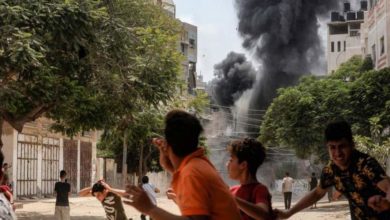Israeli arms sales have come under increasing scrutiny as long-simmering tensions between Armenia and Azerbaijan have burst into the open in recent weeks. Despite momentary ceasefires, clashes continue to rage in and around the disputed region of Nagorno-Karabakh. While the foundation of the conflict lies in the return of capitalism following the overthrow of the Soviet Union, tensions between these countries are exacerbated by Israel’s policy of arming Azerbaijan with internationally banned weapons.
Human Rights Watch reported finding remnants of Israeli-manufactured LAR-160 series cluster munition rocket and M095 dual purpose submunition in Stepanakert and Hadrut, which are residential areas in Nagorno-Karabakh and Armenia proper. A similar report was made by Amnesty International on October 5, just days after the Armenia-Azerbaijan conflict erupted, using footage that indicated the cluster bombs were fired by Azeri forces.
The storage and use of cluster bombs was internationally banned under the Convention on Cluster Munitions treaty, which was adopted on 30 May, 2008. As of September 2020, about 109 states have formally joined the treaty. Israel and Azerbaijan are not signatories of this international agreement. HRW additionally states, “regardless of specific treaty obligations, all parties to the conflict are bound by the Geneva Conventions and customary international law and must abide by the fundamental principles of international humanitarian law, which requires armed forces to distinguish between combatants and civilians.”
The use of these weapons is causing alarm due to their particularly destructive nature. Cluster submunitions often fail to explode on initial impact, leaving duds that act like landmines. Moreover, when exploded, cluster munitions can release many small submunitions over a wide geographical area and can linger, thereby putting civilians at risk during and after the attack.
The Israel-Azerbaijan relationship has been strengthening in recent years. High-level government officials, including Prime Minister Benjamin Netanyahu, visited Baku to meet with Azeri President Ilham Aliyev at the end of 2016. During that visit, President Aliyev revealed that Azerbaijan signed $5 billion worth of long-term contracts over the years to buy weapons and military equipment from Israel.
Azerbaijan is Israel’s largest oil supplier. Approximately 40 percent of Israel’s oil supply passes through the Baku-Tbilisi-Ceyhan pipeline — Perhaps Azerbaijan’s most important piece of energy infrastructure. In the pursuit of natural resources, the death and destruction its internationally-banned weapons cause in Nagorno-Karabakh is of no concern to the Israeli government.
There is an important lesson to be drawn from this situation about the limitations of relying on sectarian politics to explain the different conflicts and divisions in the Middle East. Despite the fact that Azerbaijan is a Muslim-majority country and is 85 percent Shia, Israel seeks to protect it in a conflict with a non-Muslim state — Armenia. At the same time Israel is engaged in an intense geopolitical conflict with Iran, a country which also has a Shia Muslim majority population. While Islamophobic hatred is endlessly promoted by the Israeli government, its foreign policy is dictated by the needs of its own capitalist class and the needs of its imperialist patron — the United States.
In addition to its genocidal oppression of the Palestinian people, Israel plays a destructive role throughout the whole region. Its reckless policy of exporting cruel and illegal weapons like cluster bombs to Azerbaijan has greatly worsened the suffering of the people affected by the war.





